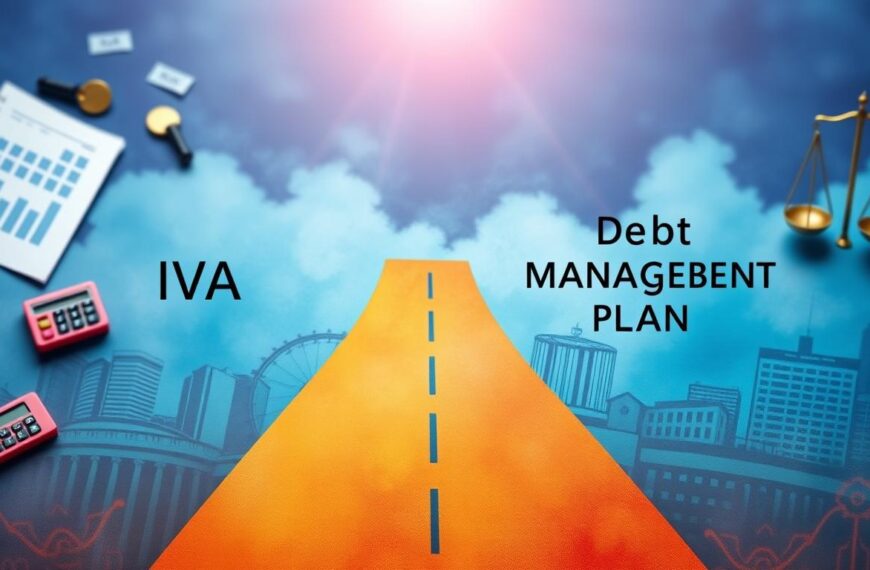Managing financial challenges can feel overwhelming, but there are numerous resources and services available across the UK to provide support. Whether you’re facing debt issues or simply need guidance on budgeting, professional advice is within reach. This article explores the top options, including both free and fee-based services, to help you regain control of your finances.
From government-backed schemes like the Breathing Space initiative, which offers up to 60 days of relief from creditor pressure, to charities such as StepChange, millions have found assistance since 19931. Organisations like Citizens Advice and National Debtline also provide free, impartial advice to those in need2.
This guide aims to offer authoritative insights into navigating debt solutions, including Debt Management Plans and other alternatives. By exploring these resources, you can take the first step towards financial stability and peace of mind.
Overview of Debt Management and Available Services
Understanding the complexities of debt is the first step towards financial recovery. Debt can affect not only your personal finances but also have broader economic implications. Recognising its impact is essential to finding the right solutions.
Understanding Debt and Its Impact
Debt is often categorised into priority and non-priority debts. Priority debts include mortgage or rent arrears, council tax, and utility bills, while non-priority debts cover credit cards, loans, and student loans3. Failing to address priority debts can lead to severe consequences, such as eviction or legal action.
Debt can also strain mental health and relationships. It’s crucial to act promptly to avoid escalating issues. A clear understanding of your financial situation is the foundation of effective debt resolution.
Identifying Your Debt Management Needs
Before choosing a solution, assess your repayment capacity. Gathering accurate financial information is vital. This includes income, expenses, and outstanding balances. Consulting a professional adviser can provide clarity on the best course of action.
Debt Management Plans (DMPs) are a popular option. These informal agreements allow you to repay debts through reduced monthly payments. However, they may take longer to clear balances, and creditors might not freeze interest3.
| Debt Type | Examples | Impact |
|---|---|---|
| Priority Debts | Mortgage arrears, council tax | Legal action, eviction |
| Non-Priority Debts | Credit cards, student loans | Credit score damage |
Timing is critical when addressing debt. The Breathing Space initiative offers a 60-day pause on enforcement actions and interest charges4. This can provide the breathing room needed to plan your next steps.
In summary, understanding your debt and exploring available services are key to regaining financial control. Whether through a DMP or other solutions, taking action is the first step towards stability.
Who Can Help with Debt Management
Navigating financial difficulties requires the right guidance and support. In the UK, several professionals and organisations are available to assist individuals in managing their finances effectively. Whether you need a tailored repayment plan or debt advice, there are options to suit your needs.
Professional Debt Advisers and Their Roles
Professional debt advisers play a crucial role in assessing financial situations. They help formulate repayment plans and negotiate with creditors on your behalf. These experts provide personalised solutions to ensure your financial stability.
For example, StepChange offers free credit counselling, including an initial interview and recommendations for a debt management plan5. Similarly, PayPlan assesses financial positions and suggests suitable repayment strategies5.
Charities and Free Debt Support Organisations
Charitable organisations provide cost-free, independent advice to those in need. National Debtline, for instance, offers free advice and a self-help pack, with potential referrals to free debt management plans5.
In Scotland, regional variations in support programmes ensure tailored assistance. The Breathing Space initiative, introduced in 2021, offers up to 60 days of legal protection from creditors, freezing most interest and charges6.
- National Debtline: Free advice and self-help resources.
- StepChange: Free credit counselling and debt management plans.
- PayPlan: Independent provider of free repayment plans.
Understanding these resources empowers you to make informed decisions. Whether through a debt relief order or a tailored plan, taking action is the first step towards financial stability.
Exploring Debt Management Plans and Alternatives
Finding the right solution for financial challenges often starts with understanding your options. A Debt Management Plan (DMP) is one such option, designed to streamline repayments to creditors. It typically lasts between five to ten years and includes only non-priority debts like credit cards and personal loans7.
To qualify for a DMP, you must have disposable income after essential living costs but not enough to repay debts in full within six months7. While not legally binding, missing payments can put the plan at risk, and it may negatively impact your credit score7.
What is a Debt Management Plan (DMP)?
A DMP is an informal agreement that allows you to repay debts through reduced monthly payments. It is managed by providers, some of whom charge a fee, while others, like StepChange and PayPlan, offer free services7. However, creditors may still contact you regarding priority debts, such as mortgages or council tax7.
While a DMP can provide relief, it’s essential to understand its limitations. For instance, it may take longer to clear balances, and creditors might not freeze interest7.
Alternative Arrangements: Administration Orders and IVAs
If a DMP isn’t suitable, alternatives like Administration Orders or Individual Voluntary Arrangements (IVAs) may be considered. An IVA, for example, is typically for debts of at least £10,000 and involves fees of £5,000 or more7. It can reduce monthly repayments significantly, from an average of £689 to £1378.
Official guidance from gov.uk and MoneyHelper can help you choose the right option. Whether it’s a DMP, IVA, or another form of debt relief, understanding the costs and benefits is crucial8.
- DMP: Informal, flexible, but may impact credit scores.
- IVA: Formal, involves fees, but reduces monthly repayments.
- Administration Orders: Court-based solution for smaller debts.
In some cases, insolvency may become necessary if conventional arrangements don’t work. Exploring these options ensures you make informed decisions tailored to your financial situation.
Choosing Between Free and Fee-Charging Providers
Deciding between free and fee-charging providers is a critical step in managing financial obligations effectively. Both options have their merits, and understanding the differences can help you make an informed choice tailored to your circumstances.
Benefits of Free Debt Counselling Services
Free debt counselling services are often funded by banks and credit card companies, ensuring no direct cost to the consumer. These providers allocate the entire monthly payment directly to creditors, potentially leading to quicker debt resolution9.
Major free providers, such as StepChange, employ professional insolvency practitioners, ensuring high-quality advice. They also handle complex cases, including those involving benefits issues and rent arrears, which commercial firms may avoid9.
Considerations for Fee-Based Providers
Fee-based providers deduct their fees before distributing payments to creditors, which can reduce the amount going towards debt reduction9. However, they may offer more personalised attention and additional support services.
It’s essential to review the fee structure, including cancellation and administration fees. Providers should disclose the total cost, estimated repayment amounts, and duration in writing10.
| Aspect | Free Providers | Fee-Based Providers |
|---|---|---|
| Cost | No direct charges | Fees deducted from payments |
| Repayment Allocation | Entire payment to creditors | Reduced amount to creditors |
| Complex Cases | Handled effectively | Often avoided |
| Personalisation | Standardised approach | Tailored services |
When choosing a provider, consider your financial situation and repayment capacity. Free services may offer quicker relief, while fee-based options could provide more individualised support. Always ensure the provider is FCA authorised and adheres to industry standards10.
UK Debt Support Organisations and Key Resources
Accessing reliable support is essential when tackling financial difficulties in the UK. Numerous organisations across the country offer tailored assistance to meet your information needs. Whether you’re in England, Wales, or Scotland, there’s a structured network of services ready to assist.
National Debtline, Citizens Advice, and StepChange
National Debtline provides free advice via phone (0808 808 4000), online, and email, along with a self-help information pack11. Citizens Advice offers support through face-to-face, telephone, or email channels, ensuring you can get help in the most convenient way11.
StepChange Debt Charity, another key resource, offers advice through phone (0800 138 1111) or online via their Debt Remedy tool. They create personalised action plans to address your financial situation11.
Regional Services in Scotland, England, and Wales
Regional variations ensure tailored support. In England and Wales, bailiffs must provide at least seven days’ notice before their first visit11. Scotland offers unique programmes like the Breathing Space initiative, which provides legal protection from creditors for up to 60 days12.
For those in England, services like PayPlan and Community Money Advice provide additional options. These organisations ensure you’re not alone in navigating financial challenges.
- National Debtline: Free advice and self-help resources.
- Citizens Advice: Face-to-face, phone, or email support.
- StepChange: Personalised debt management plans.
Understanding these resources empowers you to take control of your finances. Whether through a debt management plan or other solutions, these organisations are here to guide you every step of the way.
For more detailed guidance, explore free debt advice or learn about the differences between debt management plans and IVAs.
Comparing Debt Relief Options: Relief Orders and Insolvency
When standard repayment plans fall short, exploring debt relief options becomes essential for financial recovery. Understanding the differences between Debt Relief Orders (DROs) and insolvency can help improve your financial stability. Each option has its benefits and limitations, making it crucial to choose the right one for your situation.

Understanding Debt Relief and Debt Relief Orders
A Debt Relief Order (DRO) is designed for individuals with unsecured debts below £30,000 and a disposable income of less than £50 per month13. It requires a one-time application fee of £90, which is non-refundable if the application is rejected13. This option lasts for 12 months, after which debts are written off if the debtor’s situation does not change14.
However, a DRO has certain restrictions. Individuals cannot take out more than £500 of credit without informing the lender, and those with assets exceeding £2,000 are excluded14. Additionally, a DRO is recorded in the credit file for six years, significantly affecting credit ratings14.
When Insolvency or Bankruptcy May Be Necessary
In cases where a DRO is not suitable, insolvency or bankruptcy might be the only viable solution. An Individual Voluntary Arrangement (IVA), for example, requires a minimum of £6,000 in unsecured debt and typically lasts between 5-6 years13. It involves negotiating with creditors, requiring agreement from 75% of them for approval13.
Bankruptcy, on the other hand, is a more severe form of insolvency. It can lead to the liquidation of assets and has long-term implications on credit ratings. However, it may be necessary for those with chronic debt problems that cannot be resolved through other means.
- Debt Relief Orders: Suitable for low-income individuals with minimal assets.
- IVAs: Ideal for those with higher unsecured debts and a steady income.
- Bankruptcy: A last resort for severe financial difficulties.
Recognised organisations and charities play a vital role in guiding individuals through these complex decisions. They provide impartial advice and support, helping you weigh the long-term interest costs and credit implications of each option14.
Choosing the right debt relief option can help improve your financial stability. Whether it’s a DRO, IVA, or bankruptcy, understanding the trade-offs is key to making an informed decision.
Conclusion
Facing financial challenges requires timely action and informed decisions. Whether you opt for a Debt Management Plan (DMP) or explore alternatives like IVAs, understanding your financial need is crucial. Free services from organisations like StepChange and PayPlan ensure 100% of payments go towards reducing balances, while fee-based providers may offer tailored support15.
Taking the first step towards financial stability involves assessing your situation and choosing the right solution. Remember, consistent payments and creditor cooperation are key to success in any repayment plan16. Utilise the resources available, such as debt management plans, to regain control over your finances.
Regardless of the path you choose, a professional and informed approach will lead to better outcomes. Act now to secure a brighter financial future.
FAQ
What is a debt management plan (DMP)?
A debt management plan is an arrangement to repay your debts at an affordable rate. It’s set up by a debt adviser and involves negotiating with creditors to reduce payments or freeze interest.
Are there free services for debt advice?
Yes, organisations like National Debtline, Citizens Advice, and StepChange offer free debt counselling. These services provide guidance without charging a fee.
What is a debt relief order (DRO)?
A debt relief order is a formal solution for individuals with low income and minimal assets. It freezes repayments and interest for 12 months, after which debts may be written off.
How do I know if I need professional debt help?
If you’re struggling to meet repayments, receiving frequent calls from creditors, or feeling overwhelmed, it’s time to seek advice from a debt adviser or charity.
What are the alternatives to a debt management plan?
Alternatives include individual voluntary arrangements (IVAs), administration orders, or bankruptcy. Each option depends on your financial situation and the level of debt.
Can I get debt advice in Scotland, England, or Wales?
Yes, organisations like Citizens Advice and StepChange operate across the UK. Regional services are also available to provide tailored support.
What’s the difference between free and fee-charging debt services?
Free services are offered by charities and non-profits, while fee-charging providers may offer additional features or faster solutions. Always compare options before committing.
When should I consider insolvency or bankruptcy?
Insolvency or bankruptcy may be necessary if you cannot repay debts and other solutions aren’t viable. Consult an insolvency practitioner for advice.
How can I find a reliable debt adviser?
Look for advisers registered with the Financial Conduct Authority (FCA) or recommended by trusted organisations like Citizens Advice or National Debtline.
What information do I need to prepare for debt advice?
Gather details about your income, expenses, debts, and creditors. This information helps advisers assess your situation and recommend the best solution.
Source Links
- https://www.stepchange.org/how-we-help.aspx
- https://www.britishlegion.org.uk/get-support/expert-guidance/money-debt/debt-management-plan
- https://www.citizensadvice.org.uk/debt-and-money/debt-solutions/debt-management-plans/debt-management-plans-explained/debt-management-plans-what-you-need-to-know/
- https://nationaldebtline.org/get-information/guides/debt-management-plans-ew/
- https://www.citizensadvice.org.uk/debt-and-money/debt-solutions/debt-management-plans/getting-a-debt-management-plan/do-you-need-to-pay-for-a-debt-management-plan/
- https://www.money.co.uk/guides/how-to-get-free-debt-help
- https://www.experian.co.uk/consumer/guides/debt-management-plan.html
- https://moneyadvice.co.uk/debt-solutions/debt-management-plan/
- https://debtcamel.co.uk/choosing-a-debt-management-company/
- https://www.citizensadvice.org.uk/debt-and-money/debt-solutions/debt-management-plans/getting-a-debt-management-plan/choosing-a-debt-management-plan-provider/
- https://www.ageuk.org.uk/information-advice/money-legal/debt-savings/debt-advice/
- https://capuk.org/get-help/cap-debt-help
- https://pennyplan.co.uk/insights/iva-vs-debt-relief-order-dro/
- https://www.cashfloat.co.uk/blog/money-saving/debt-management-plan-vs-debt-relief-order/
- https://www.payplan.com/debt-solutions/debt-management-plans/
- https://www.payplan.com/debt-solutions/debt-management-plans/questions/
















